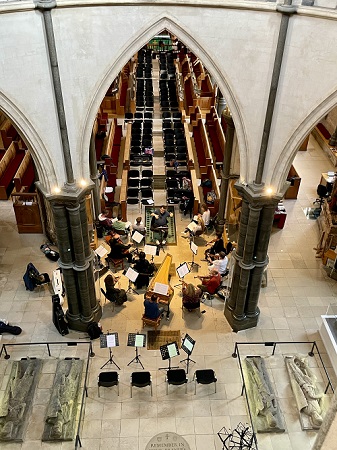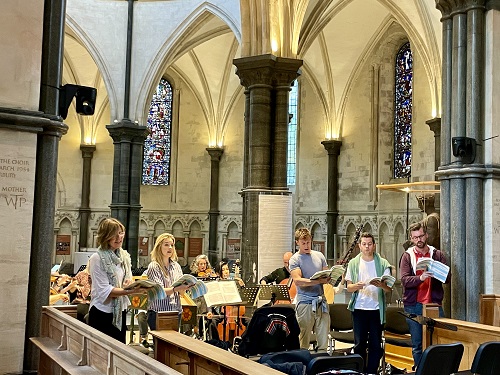Gustav Holst condemned the entire genre of semi-opera as ‘almost insuperable’, at once ‘too dramatic for the concert platform’ and ‘too incoherent for the stage’. How, he asked, are these works to be staged in a way that gives some semblance of dramatic unity? For that matter, how were they staged? The absence of both Dryden’s original text and Purcell’s original score does not help us in this matter, and many contemporary performances of King Arthur, including this one at Temple Church, opt out of a stage altogether. How much of King Arthur‘s dramatic potential is lost through the total exclusion of its choreographic dimension is a subject for debate. In any case, the murky origins of the work certainly grant a license for flexibility.
For this splendid production by the Early Opera Company, Thomas Guthrie went a step further, exchanging the spoken portions of Dryden’s text for a new script in which the characters are consolidated into a single narrator. It is ironic that such an editorial move cuts precisely those portions of the text with which Dryden was most satisfied. In the collaborative process, Dryden begrudgingly deferred to the needs of the composer: ‘But the Numbers of Poetry and Vocal Musick, are sometimes so contrary, that in many places I have been oblig’d to cramp my Verses, and make them rugged to the Reader, that they may be harmonious to the Hearer’. The same cannot be said of Dryden’s logorrheic spoken passages.

Some scenes are cut entirely in Guthrie’s adaptation. Though a full synopsis was printed in the concert booklet, there was, for example, no appearance in the actual performance of the opera’s most gruesome scene, in which a bewitched Arthur imagines that the tree he is attempting to fell is the now bleeding body of his beloved Emmeline. But Guthrie’s script is not to be dismissed as a mere budget-option. Indeed, it has a remarkable poetic economy. The result is a kind of seventeenth-century radio opera whose narration succeeds in sustaining a dynamic and thoroughly coherent drama.
Of course, the success of Guthrie’s adaptation relies on the skill of its narrator, and in this role the actress Lindsay Duncan left nothing to be desired. The last time I saw Duncan, she was activating a nuclear device on Mars (see Doctor Who). In King Arthur, which in some ways is a no less fanciful story, Duncan carried the evening. She sensitively balanced the script’s moments of power and intimacy. Her sense of pacing in Act II, when the blind Emmeline is granted the power of sight by Merlin and beholds Arthur for the first time in an enchanted grove, was spellbinding. For future performances, one hopes that Guthrie might consider providing such an acute narrator with a spoken Epilogue to replace Dryden’s coy original (‘And he that likes the Musick and the Play,/ Shall be my Favourite Gallant to Day’).

Generously sponsored by Blackstone Chambers for Temple Music, this was a performance of the highest interpretive standard. Sopranos Rowan Pierce and Mhairi Lawson, both commanding presences in their individual roles, dazzled as two shepherdesses and again as a pair of sirens who attempt to distract Arthur (‘Hell entertains me, like some welcome Guest’) from his quest through Osmond’s enchanted wood. Pierce and Lawson shared the spotlight in ‘Fairest Isle’, each taking a stanza. Tenor Samuel Boden was joined by James Way, who stepped in for a sadly indisposed Nick Pritchard on Thursday evening. Readers may be familiar with Way’s 2019 recording of King Arthur with the Gabrieli Consort for Signum Records. If there is a more rousing rendition of ‘Come if you dare’ than Way’s, I have yet to hear it. It was during the ‘Frost Scene’ of Act III, however, that the energies of the singers and orchestra, led by founder and director Christian Curnyn, most fully emerged. Bass-baritone Edward Grint masterfully embodied Dryden’s enigmatic ‘Cold Genius’, matching the slow procession of Purcell’s phrases with a weary, measured gait that conveyed at once the power and pain of this disturbed spirit (‘What power art thou, who from below/ Hast made me rise unwillingly and slow/From beds of everlasting snow?’).
Commentary on King Arthur rightly focuses on the fascinating political context surrounding its origin: the aftermath of the Glorious Revolution, Dryden’s idealization of Charles II, conflict between Protestants and Catholics, between Whigs and Royalists, and so on. The work is born of those political and folkloric tensions that continue to test British identity and to a certain extent define it. In the twenty-first century, the international politics of King Arthur have again come to the fore: its rejection of ‘foreign kings’, its references to fishing rights, its call for a future in which ‘Britons and Saxons shall be once one People;/ One Common Tongue, one Common Faith shall bind/ Our Jarring Bands, in a perpetual Peace.’ Is there a major British composer today who would write, as Purcell did, with such empathy for a merry band of Kentish Lads who ‘heigh for the honour of old England’? The soft ripple of laughter that greeted the light-hearted chauvinism of Guthrie’s prologue had, by the time we reached ‘Fairest Isle’, stilled to something like collective nostalgia – though for when or what I could not say.
Eric McElroy
Purcell, King Arthur
Early Opera Company: Christian Curnyn (director), Lindsay Duncan (narrator), Mhairi Lawson, (soprano), Rowan Pierce (soprano), Samuel Boden (tenor), James Way (tenor), Edward Grint (bass-baritone), Thomas Guthrie (scriptwriter)
Temple Church, London; Thursday 28th September 2023.
Rehearsal images courtesy of the Early Opera Company